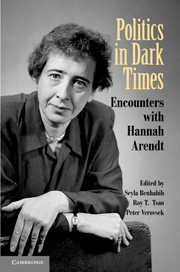Book contents
- Frontmatter
- Contents
- Notes on Contributors
- Introduction
- Part I Freedom, Equality, and Responsibility
- Part II Sovereignty, the Nation-State, and the Rule of Law
- 6 Banishing the Sovereign? Internal and External Sovereignty in Arendt
- 7 The Decline of Order: Hannah Arendt and the Paradoxes of the Nation-State
- 8 The Eichmann Trial and the Legacy of Jurisdiction
- 9 International Law and Human Plurality in the Shadow of Totalitarianism: Hannah Arendt and Raphael Lemkin
- Part III Politics in Dark Times
- Part IV Judging Evil
- Index
8 - The Eichmann Trial and the Legacy of Jurisdiction
Published online by Cambridge University Press: 05 June 2012
- Frontmatter
- Contents
- Notes on Contributors
- Introduction
- Part I Freedom, Equality, and Responsibility
- Part II Sovereignty, the Nation-State, and the Rule of Law
- 6 Banishing the Sovereign? Internal and External Sovereignty in Arendt
- 7 The Decline of Order: Hannah Arendt and the Paradoxes of the Nation-State
- 8 The Eichmann Trial and the Legacy of Jurisdiction
- 9 International Law and Human Plurality in the Shadow of Totalitarianism: Hannah Arendt and Raphael Lemkin
- Part III Politics in Dark Times
- Part IV Judging Evil
- Index
Summary
Although the phenomenon of political trials has a long history that goes back to the beginning of Western civilization, to the trials of Jesus and Socrates, it has gained renewed interest of late. This interest was triggered by developments in international law, in particular the possibility of bringing heads of state to trial for crimes of genocide, crimes against humanity, and war crimes in national courts exercising universal jurisdiction. Although the legal cases vary, defendants such as Yugoslav president Slobodan Milošević, former Chilean dictator General Augusto Pinochet, and Israeli prime minister Ariel Sharon all raised one common defense: They claimed that the proceedings against them amounted to a political trial.
In my book Transformative Justice: Israeli Identity on Trial, I tackled the dilemma of the political trial with the help of political theory elaborated by Otto Kirschheimer, Judith Shklar, and Hannah Arendt. In this chapter, I would like to develop the theory of political justice further and apply it to what I call “the new (international) political trial.” I offer a reading of the Adolf Eichmann trial as occupying the intersection between national political trial and international political trial. I focus on one aspect of the trial – the legacy of jurisdiction – and on a neglected aspect of Hannah Arendt's writing on the trial. I argue that it is in this seemingly legalistic aspect of the trial that we can identify the roots of a crisis for modern criminal law that emerged in the wake of World War II. It reveals the deep sense in which an important source of legitimacy for the criminal law, its connection to a single and coherent political community, has been undermined and is in need of a new articulation.
- Type
- Chapter
- Information
- Politics in Dark TimesEncounters with Hannah Arendt, pp. 198 - 218Publisher: Cambridge University PressPrint publication year: 2010
- 3
- Cited by



